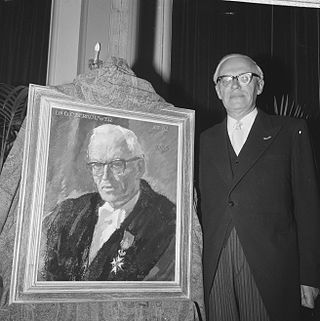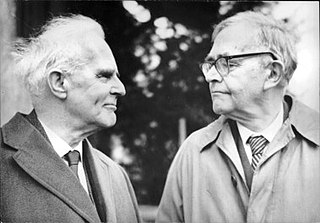
Arminianism is a movement of Protestantism initiated in the early 17th century, based on the theological ideas of the Dutch Reformed theologian Jacobus Arminius and his historic supporters known as Remonstrants. Dutch Arminianism was originally articulated in the Remonstrance (1610), a theological statement submitted to the States General of the Netherlands. This expressed an attempt to moderate the doctrines of Calvinism related to its interpretation of predestination.

Calvinism, also called Reformed Christianity, is a major branch of Protestantism that follows the theological tradition and forms of Christian practice set down by John Calvin and various other Reformation-era theologians. It emphasizes the sovereignty of God and the authority of the Bible.

Predestination, in theology, is the doctrine that all events have been willed by God, usually with reference to the eventual fate of the individual soul. Explanations of predestination often seek to address the paradox of free will, whereby God's omniscience seems incompatible with human free will. In this usage, predestination can be regarded as a form of religious determinism; and usually predeterminism, also known as theological determinism.

Predestination is a doctrine in Calvinism dealing with the question of the control that God exercises over the world. In the words of the Westminster Confession of Faith, God "freely and unchangeably ordained whatsoever comes to pass." The second use of the word "predestination" applies this to salvation, and refers to the belief that God appointed the eternal destiny of some to salvation by grace, while leaving the remainder to receive eternal damnation for all their sins, even their original sin. The former is called "unconditional election", and the latter "reprobation". In Calvinism, some people are predestined and effectually called in due time to faith by God, all others are reprobated.
The five solae of the Protestant Reformation are a foundational set of Christian theological principles held by theologians and clergy to be central to the doctrines of justification and salvation as taught by the Calvinism and Lutheranism branches of Protestantism, as well as in some branches of Pentecostalism. Each sola represents a key belief in these Protestant traditions that is distinct from the theological doctrine of the Catholic Church, although they were not assembled as a theological unit until the 20th century. The Reformers are known to have only clearly stated two of the five solae. Even today there are differences as to what constitutes the solae, how many there are, and how to interpret them to reflect the Reformers' beliefs.

In Christian theology, synergism is the belief that salvation involves some form of cooperation between divine grace and human freedom. Synergism is upheld by the Catholic Church, Eastern Orthodox Churches, Oriental Orthodox Churches, Anabaptist Churches and Methodist Churches. It is an integral part of Arminian theology common in the General Baptist and Methodist traditions.
Systematic theology, or systematics, is a discipline of Christian theology that formulates an orderly, rational, and coherent account of the doctrines of the Christian faith. It addresses issues such as what the Bible teaches about certain topics or what is true about God and his universe. It also builds on biblical disciplines, church history, as well as biblical and historical theology. Systematic theology shares its systematic tasks with other disciplines such as constructive theology, dogmatics, ethics, apologetics, and philosophy of religion.

Covenant theology is a conceptual overview and interpretive framework for understanding the overall structure of the Bible. It uses the theological concept of a covenant as an organizing principle for Christian theology. The standard form of covenant theology views the history of God's dealings with mankind, from Creation to Fall to Redemption to Consummation, under the framework of three overarching theological covenants: those of redemption, of works, and of grace.

Unconditional election is a Calvinist doctrine relating to predestination that describes the actions and motives of God prior to his creation of the world, when he predestined some people to receive salvation, the elect, and the rest he left to continue in their sins and receive the just punishment, eternal damnation, for their transgressions of God's law as outlined in the Old and New Testaments of the Bible. God made these choices according to his own purposes apart from any conditions or qualities related to those persons.
Prevenient grace is a Christian theological concept that refers to the grace of God in a person's life which precedes and prepares to conversion. The concept was first developed by Augustine of Hippo (354–430), was affirmed by the Second Council of Orange (529) and has become part of Catholic theology. It is also present in Reformed theology, through the form of an effectual calling leading some individuals irresistibly to salvation. It is also in Arminian theology, according to which it is dispensed universally in order to enable people to respond to the offer of salvation, though it does not ensure personal acceptance.

Gerrit Cornelis "G.C." Berkouwer was for years the leading theologian of the Reformed Churches in the Netherlands (GKN). He occupied the chair in systematic theology of the Faculty of Theology, Free University (VU) in Amsterdam.

Heinrich Emil Brunner (1889–1966) was a Swiss Reformed theologian. Along with Karl Barth, he is commonly associated with neo-orthodoxy or the dialectical theology movement.
Within Christianity, faith, in one sense, is often discussed in terms of believing God's promises, trusting in his faithfulness, and relying on God's character and faithfulness to act. Some denominations believe in the New Covenant and in the doctrine of salvation by faith alone. According to most Christian traditions and denominations, Christian faith requires a belief in the resurrection of Jesus, and the Agony in the Garden which Jesus states is the plan of God the Father.

The history of the Calvinist–Arminian debate begins in early 17th century in the Netherlands with a Christian theological dispute between the followers of John Calvin and Jacobus Arminius, and continues today among some Protestants, particularly evangelicals. The debate centers around soteriology, or the study of salvation, and includes disputes about total depravity, predestination, and atonement. While the debate was given its Calvinist–Arminian form in the 17th century, issues central to the debate have been discussed in Christianity in some form since Augustine of Hippo's disputes with the Pelagians in the 5th century.
Regeneration, while sometimes perceived to be a step in the ordo salutis, is generally understood in Christian theology to be the objective work of God in a believer's life. Spiritually, it means that God brings a person to new life from a previous state of separation from God and subjection to the decay of death. Thus, in Lutheran and Roman Catholic theology, it generally means that which takes place during baptism. In Calvinism and Arminian theology, baptism is recognized as an outward sign of an inward reality which is to follow regeneration as a sign of obedience to the New Testament; as such, the Methodist Churches teach that regeneration occurs during the new birth.

Wesleyan theology, otherwise known as Wesleyan–Arminian theology, or Methodist theology, is a theological tradition in Protestant Christianity based upon the ministry of the 18th-century evangelical reformer brothers John Wesley and Charles Wesley. More broadly it refers to the theological system inferred from the various sermons, theological treatises, letters, journals, diaries, hymns, and other spiritual writings of the Wesleys and their contemporary coadjutors such as John William Fletcher.
In its widest sense, the phrase union with Christ refers to the relationship between the believer and Jesus Christ. In this sense, John Murray says, union with Christ is "the central truth of the whole doctrine of salvation." The expression "in Christ" occurs 216 times in the Pauline letters and 26 times in the Johannine literature. Hence, according to Albert Schweitzer, "This 'being-in-Christ' is the prime enigma of the Pauline teaching: once grasped it gives the clue to the whole." Given the large number of occurrences and the wide range of contexts, the phrase embodies a breadth of meaning.

Cornelius Van Til was a Dutch-American Reformed theologian, who is credited as being the originator of modern presuppositional apologetics.

Justification from eternity is a concept within Protestant theology asserting that the justification of a believer takes place at least partially in eternity past.
The Reformed systematic theology bibliography lists complete works of systematic theology in the Reformed tradition. Systematic theology is the orderly formulation of Christian doctrines and beliefs. This bibliography includes works which attempt to present a coherent account of all major doctrines of the Reformed faith. Theologians considered by scholars to be in the Reformed tradition are included, even if they are considered to have departed from any particular conception of the Reformed faith.









